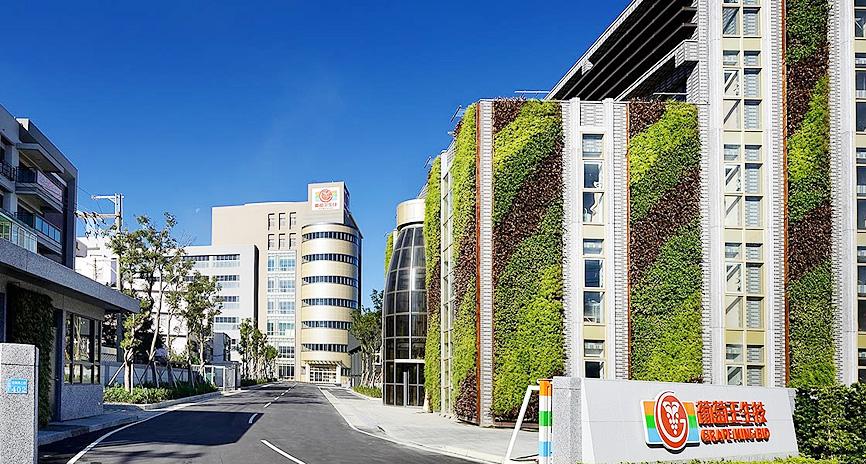Grape King Bio Ltd’s (葡萄王) board of directors on Friday approved a private placement from Uni-President Enterprises Corp (統一企業), giving it an 8 percent stake in the nutritional supplement firm.
In the deal, Grape King would issue up to 11.851 million new common shares to Uni-President, which would become a strategic investor, the Taoyuan-based supplier of probiotics and mycelium health foods said in a statement.
Unlike a public offering, an investor in a private placement is subject to a three-year lockup period, it said.

Photo courtesy of Grape King Bio Ltd
The deal is expected to further bolster their collaboration in the food and beverage, and health and wellness sectors, Grape King said.
“This strategic collaboration will be a key driver of growth for Grape King Bio,” chairman and CEO Andrew Tseng (曾盛麟) said. “We are confident that the combination of Uni-President’s know-how in running successful multinational food and beverage and retail businesses, along with Grape King’s expertise in health supplements, will yield attractive growth opportunities.”
Uni-President, the nation’s largest food and beverage conglomerate, said in its regulatory filing that its board of directors had agreed to the private placement at a cost no higher than NT$2.015 billion (US$69.94 million).
The deal comes as many nations face aging populations and businesses have seen a greater demand for preventive care, while the partnership would allow both firms to leverage their respective expertise in products and services, distribution networks, manufacturing, marketing and food safety.
“This collaboration will ensure that overseas expansions can be achieved more rapidly utilizing Uni-President’s overseas production plants to manufacture high-quality products for global healthcare markets,” Grape King said.
The company would share its knowledge and experience in supplements and biotechnology with Uni-President, and help its partner expand its offerings in the health and wellness sector, it said.
Grape King’s Taiwan Accreditation Foundation-certified laboratory and Uni-President’s food safety center would work together to improve food safety systems, ensure zero risk to food safety and promote superior food quality, it said.
The private placement is expected to be completed after gaining shareholders’ approval in an extraordinary general meeting on Jan. 14, as well as regulatory approval, it added.
Grape King reported cumulative revenue of NT$7.16 billion in the first 10 months of the year, down 2.26 percent from NT$7.32 billion a year earlier.
Net profit in the first three quarters totaled NT$851.11 million, down from NT$880.88 million a year earlier, or earnings per share of NT$6.25.
Uni-President’s major subsidiaries include President Chain Store Corp (統一超商) in Taiwan and Uni-President China Holdings Ltd (統一中國控股) in China.
The Tainan-based company also operates President Pharmaceutical Corp (統一藥品), fitness and spa center operator Being Corp (統一佳佳) and President Drugstore Business Corp (統一生活事業), which owns the nation’s second-largest drugstore chain, Cosmed (康是美).
In the first 10 months of the year, Uni-President’s cumulative revenue totaled NT$377.28 billion, down 0.8 percent from NT$380.33 billion a year earlier.
Net profit in the first three quarters increased from NT$16.193 billion to NT$17.999 billion, or earnings per share of NT$3.17.

In Italy’s storied gold-making hubs, jewelers are reworking their designs to trim gold content as they race to blunt the effect of record prices and appeal to shoppers watching their budgets. Gold prices hit a record high on Thursday, surging near US$5,600 an ounce, more than double a year ago as geopolitical concerns and jitters over trade pushed investors toward the safe-haven asset. The rally is putting undue pressure on small artisans as they face mounting demands from customers, including international brands, to produce cheaper items, from signature pieces to wedding rings, according to interviews with four independent jewelers in Italy’s main

Japanese Prime Minister Sanae Takaichi has talked up the benefits of a weaker yen in a campaign speech, adopting a tone at odds with her finance ministry, which has refused to rule out any options to counter excessive foreign exchange volatility. Takaichi later softened her stance, saying she did not have a preference for the yen’s direction. “People say the weak yen is bad right now, but for export industries, it’s a major opportunity,” Takaichi said on Saturday at a rally for Liberal Democratic Party candidate Daishiro Yamagiwa in Kanagawa Prefecture ahead of a snap election on Sunday. “Whether it’s selling food or

CONCERNS: Tech companies investing in AI businesses that purchase their products have raised questions among investors that they are artificially propping up demand Nvidia Corp chief executive officer Jensen Huang (黃仁勳) on Saturday said that the company would be participating in OpenAI’s latest funding round, describing it as potentially “the largest investment we’ve ever made.” “We will invest a great deal of money,” Huang told reporters while visiting Taipei. “I believe in OpenAI. The work that they do is incredible. They’re one of the most consequential companies of our time.” Huang did not say exactly how much Nvidia might contribute, but described the investment as “huge.” “Let Sam announce how much he’s going to raise — it’s for him to decide,” Huang said, referring to OpenAI

The global server market is expected to grow 12.8 percent annually this year, with artificial intelligence (AI) servers projected to account for 16.5 percent, driven by continued investment in AI infrastructure by major cloud service providers (CSPs), market researcher TrendForce Corp (集邦科技) said yesterday. Global AI server shipments this year are expected to increase 28 percent year-on-year to more than 2.7 million units, driven by sustained demand from CSPs and government sovereign cloud projects, TrendForce analyst Frank Kung (龔明德) told the Taipei Times. Demand for GPU-based AI servers, including Nvidia Corp’s GB and Vera Rubin rack systems, is expected to remain high,